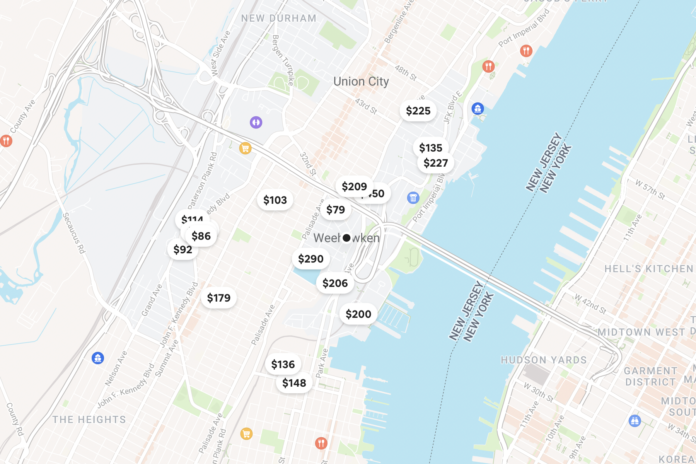Weehawken has officially enacted a ban on short-term housing rentals in the township.
The move prohibits rentals of less than 30 consecutive days, targeting short-term rental hosts who use vacation rental companies like Airbnb and Booking.com to rent out units for short periods of time as opposed to renting to a long-term tenant.
Weehawken, a waterfront community right on the Hudson River with eye candy views of New York City, is a hotspot for short-term or vacation rentals. As of December 20, there were plenty of listings for short-term rentals on Airbnb, ranging from anywhere $92 to $375 and beyond.
Banning short-term and vacation rentals
The short-term rentals were previously allowed if the rental hosts maintain a permit. That permit had to be renewed annually for a small fee, and the host was allowed to offer listing on Airbnb and other such services
At its December 21 meeting, Mayor Richard Turner and the Weehawken Township council adopted an ordinance that would effectively ban short-term rentals in the township.
Prior to the meeting, Turner told the Hudson Reporter that the ordinance bans short-term rentals less than 30 consecutive days, but that the township was looking into potentially allowing them again with stringent regulations at a later date.
“We’re going to examine all the ordinances all the other towns have put in, but right now we’re going to ban them because it really is starting to get out of control,” Turner said.
According to Turner, the township is having issues with the short-term rentals taking away affordable housing from long-term use in rent-controlled buildings.
“The bigger problem we’re having now is some of our affordable housing buildings and the buildings under rent-control are starting to do Airbnb,” Turner said. “What that does is it takes affordable units off the market. We are losing affordable apartments to Airbnb and we decided to take some action because we have several buildings that are getting carried away with it.”
Turner said that in new buildings, the condominium associations usually ban Airbnbs. Instead, they are prevalent in the affordable housing, with one instance of five Airbnbs in one building as recent as last year, Turner said.
Residents uncomfortable and strangers bringing crime?
In addition to taking affordable units off the market, Turner argued that the short-term rentals are making residents uncomfortable at the apartment buildings where they occur. Although located in densely populated Hudson County, the small township is still mostly suburban in nature prompting complaints from residents about strangers coming and going, he said.
“We get complaints all over town from people that are not comfortable with their neighbors renting on Airbnb if it’s a three-unit rental building and there’s strangers coming and going,” Turner said. “We live in an urban area and it’s a small town and people are just not comfortable.”
Another reason behind the proposed ban on short-term rentals is crime. He said that sometimes, people offer these short-term rentals and realize their property and even furniture has gone missing.
“People rent out their apartments and they complain that something was missing,” Turner said. “That’s prevalent. We’ve had people complain about heirlooms being taken and furniture being taken and pictures being taken and this and that.”
According to Turner, this ban would not be affecting mom-and-pop hosts as much as it would be investors looking to profit off of the short-term rentals.
“The industry says I’m depriving the mom-and-pop owners of the house,” Turner said. “I’m not aware of any mom-and-pop owners, somebody that lives in the house looking forward to renting it out on a regular basis. It’s so rare and it’s just not that type of town.”
Turner said that most short-term rentals in Weehawken are owned by absentee landlords who often don’t live in the township.
“The problem comes from absentee landlords of the multi-families, the affordable ones, or the regular houses,” Turner said. “You can have six houses in a row that are owner occupied and the seventh house is three units of Airbnb. Most people that do it are absentee landlords and they make more money than if they just rent it to regular people.”
Stiff penalties aim to curb short-term rentals
The penalties for each violation of the ordinance began at $1,000 for the first time, $1,500 for the second time, and $2,000 for the third time, with the possibility of 90 days of jail time. Turner said this was to discourage the practice through significant loss of income, with the fine being equivalent to what he said was the income of bookings for two short-term rentals.
“We have to make the fine as hefty as the lawyers think we can get away with so that people don’t say it’s worth it to just pay the fine,” Turner said. “If they start getting hit with some $2,000 dollar fines, I think the significant income loss would discourage it.”
Turner said the township was comfortable with the ban, doing so now in the Winter to prepare for what is usually a rush in Weehawken in the Spring. However, the township will examine other policies from neighboring municipalities, such as Jersey City which passed strict regulations on short-term rentals in the past, to see if Weehawken would benefit from them.
“We’re doing this now before the Spring comes, that’s when it really starts up again, not too much in the Winter,” Turner said. “We’re very comfortable with this. But we’ll take a look at everything just to see if there’s anything else that makes sense.”
For updates on this and other stories, check www.hudsonreporter.com and follow us on Twitter @hudson_reporter. Daniel Israel can be reached at [email protected].






